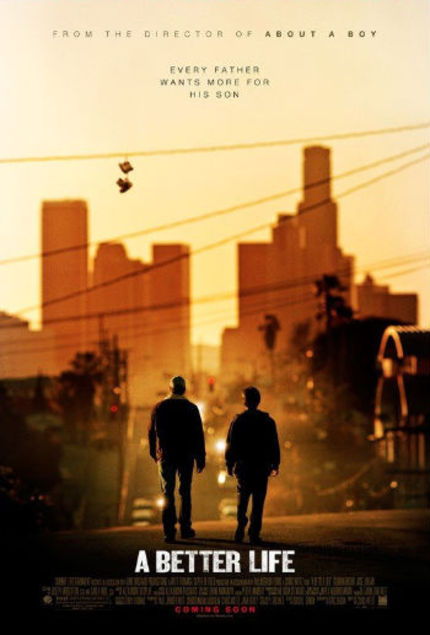Hollywood Grind: Green Lantern, Meet the Mexicans

This morning, I saw an advance screening of Chris Weitz's superb aspirational drama A Better Life, and so Mexicans have been on my mind. Green Lantern is this week's major release -- we'll have a couple of reviews rolling out soon -- and A Better Life doesn't open until next week, but I want to talk about Mexicans in the movies more than I want to try and decipher the Green Lantern Corps. And, as it happens, superheroes and minorities have a lot in common, anyway.
The most obvious point is that, by definition, superheroes on Earth are minorities. That's most obviously been a thread that's run through the X-Men franchise, and continues with Matthew Vaughn's X-Men: First Class. But it's a plot strand that's rarely been explored in other superhero movies, in part because superheroes have superpowers that elevate them above run of the mill humanity. Sure, the responsibility may weigh upon them heavily (Spider-Man) and they may wish the power had never been thrust upon them (Hulk) and they may become the target of weird villains (Iron Man 2) and they may struggle with the impossibility of saving everyone who needs saving (Superman) ... still, they've got those superpowers in their back pocket, waiting in reserve, ready to be used if they really need help getting out of a jam. In Martin Campbell's Green Lantern, Hal Jordan (Ryan Reynolds) has superhero status thrust upon him in the form of a ring that grants him superpowers. He didn't seek out it out; it came to him. And he has issues.
In the real world, minorities don't have superpowers. Quite often, the opposite is true: they struggle because they don't have any power, politically, economically, or otherwise. As a comparison between superheroes and real-world minorities, let's take Green Lantern as an example. A casual perusal of the cast listing reveals that the only obviously Latino character is described as "Latino Victim," played by Nick Gomez. Without having seen the movie in advance, I'm not sure how this particular Latino becomes a victim; most likely, he's an innocent bystander, not the object of political oppression.
But, let's face it, persons of color are still most often relegated to supporting roles or bit parts in big-budget Hollywood studio films. I'm not arguing that minorities should be shoehorned into roles for which they're not suited simply for the sake of minority representation. It would be refreshing, however, to see more films that go beyond representing only the white majority in leading roles.
Which brings us back to A Better Life, the simple story of a man and his truck. That story is credited to Roger L. Simon, author of the Moses Wine detective novels, and screenwriter of the excellent The Big Fix and Enemies, A Love Story. I don't know how closely Eric Eason's screenplay resembles Simon's story, but the thing is, it's really good.
The man is a gardener named Carlos Galindo (Demián Bichir), an illegal immigrant who has been in the U.S. for many years. He works very hard to provide for his 14-year-old son Luis (José Julián) -- the wife and mother is long gone -- always keeping his head down and trying to stay invisible, acutely aware of his illegal status, cognizant that a single misstep could send him back to Mexico and separate him from his son. His boss is retiring and returning to Mexico; he offers Carlos the opportunity to buy his truck, which brings with it all his customers, and a path to a better life.
The story is told with subtlety and sensitivity. And here's what really sets it apart: it's told entirely from the point of view of Carlos and Luis. We don't have the old "white man explores a foreign culture." Instead, we have an insider's perspective on life among the lower classes in Los Angeles, a world that, yes, features many Mexicans, but also Latinos of other nationalities, as well as immigrants from Asia, Africa, and Europe, all living and striving to make a better life for themselves and their families.
Strangely enough, I thought of the first section of Thor, the scenes where Thor is kicking back with his friends, fighting with his comrades, arguing with his father and brother. It's only when he comes to Earth that Thor becomes a minority; before then, he was an equal, more or less, with the other people living in his realm.
That's the feeling captured by A Better Life. We see things through the eyes of Carlos and Luis; they're not better than anyone else, they're just struggling to carve out the best life possible.
There's something inherently super-heroic about that. But Carlos and Luis don't need a ring to be superheroes; they just need a truck.
Green Lantern opens wide on Friday. A Better Life will have a gala screening at the Los Angeles Film Festival next Tuesday, June 21 before opening on Friday, June 24.







